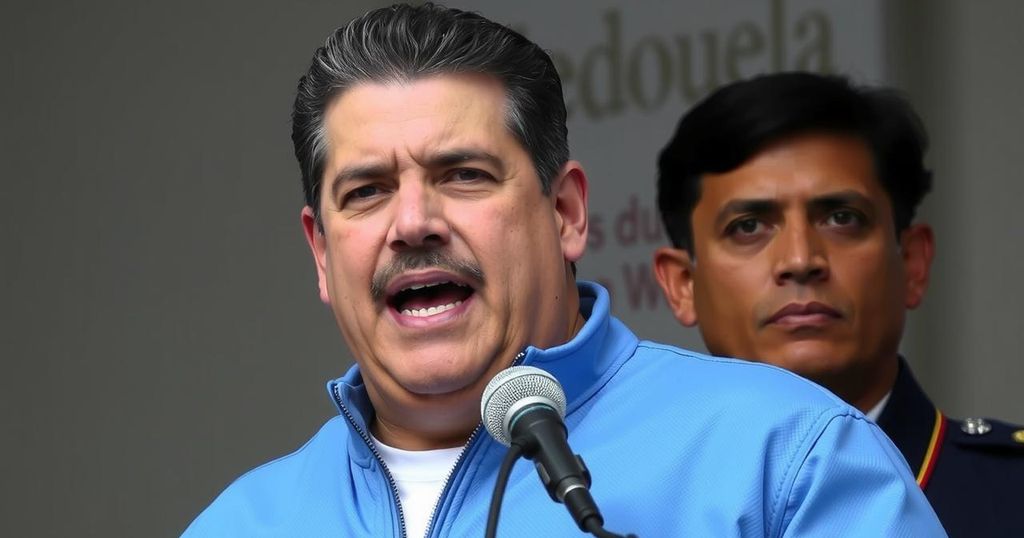Maduro Set to Begin Third Term in Venezuela Amid Election Controversy

Nicolás Maduro is set to begin his third term amid allegations of rigging in the July 28 elections, which many believe were won by opposition leader Edmundo González. International observers, including the Carter Center, support claims substantiating the opposition’s victory. Despite calls for protests against his administration, the regime’s severe crackdowns have instilled fear among potential demonstrators. The situation complicates U.S. diplomatic relations under the incoming Trump administration.
Nicolás Maduro, the Venezuelan leader often referred to as a dictator, is set to commence his third six-year term on January 10. This inauguration will take place in a congress heavily influenced by the ruling party, amidst widespread skepticism regarding the legitimacy of the July 28 election results. Many international and domestic observers have raised concerns about the fairness of the electoral process, which saw Maduro declared the winner by over a million votes. However, opposing candidate Edmundo González is widely believed to have actually won the election in a landslide, with independent observers such as the U.S.-based Carter Center affirming the validity of the opposition’s tally sheets.
The upcoming swearing-in ceremony for Maduro is seen by critics as a blatant violation of the electoral will of the Venezuelan populace. “Maduro assuming another term on Friday is a blatant violation of the votes of the Venezuelan people. The published tally sheets back that up,” stated Jason Marczak, vice president and senior director of the Atlantic Council’s Adrienne Arsht Latin America Center. Maduro’s continuing governance is expected to perpetuate a series of cronyistic policies amid rising inflation and food insecurity, which have marred his tenure.
Protests are to be organized by opposition groups a day before the inauguration, aimed at challenging Maduro’s grip on power. Yet, following a severe crackdown post-election, where over 2,000 arrests occurred, a pervasive climate of fear has emerged, potentially stifling public dissent. Opposition leader María Corina Machado, after months of seclusion, plans to re-engage politically in a last-ditch effort against Maduro.
Meanwhile, Edmundo González, recognized internally and externally as the rightful president-elect, fled to Spain to evade arrest warrants issued against him. Recently re-emerging to galvanize support, he met President Biden, describing the encounter as “long, fruitful, and cordial.” This meeting coincides with a heightened threat from the Venezuelan government, which has increased its bounty to $100,000 for information regarding González’s location.
As President Trump approaches a second term, concerns persist regarding his administration’s strategy toward Venezuela. Trump’s rhetoric during his first term was distinctly critical of Maduro, although reports indicate that Maduro is now seeking to mend ties, suggesting dialogue founded on respect and mutual understanding. These developments raise significant questions about how the incoming administration will respond to the regime in Caracas, particularly given the ongoing humanitarian crisis and mass exodus of Venezuelans. Marczak notes that upcoming strategies may reflect lessons learned from earlier pressures imposed under the last administration.
The Maduro regime continues to leverage detentions, including that of U.S. citizens, potentially as bargaining chips with the future U.S. administration. Charges faced by these individuals typically involve serious allegations such as espionage or terrorism, raising alarm among U.S. officials regarding the safety of citizens overseas.
The political landscape in Venezuela remains tumultuous as Nicolás Maduro prepares to officially begin a controversial third term following contested elections. Maduro’s regime has faced criticism for its authoritarian approaches, including the suppression of dissent and manipulation of electoral outcomes. Analysts have pointed to the broader implications of Maduro’s continued rule on regional stability and the ongoing humanitarian crisis resulting from economic mismanagement and political repression. The international community is closely monitoring the situation as key opposition figures attempt to rally support against the Maduro government amidst escalating tensions and repression.
Maduro’s swearing-in ceremony amid contested election results epitomizes the ongoing political strife in Venezuela. The legitimacy of his presidency remains under question, supported by significant international and domestic outcry. As opposition leaders mobilize for protests against his regime, the United States faces critical decisions regarding its policy toward Venezuela. The ramifications of these developments not only influence Venezuelan society but also resonate throughout the broader geopolitical landscape in Latin America.
Original Source: www.foxnews.com







